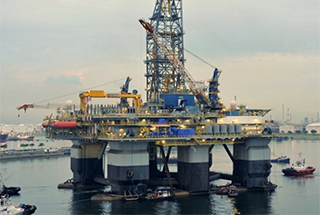(Bloomberg) --The world’s two biggest builders of oil rigs saw their stocks rise the most in more than two years last month as crude rebounded. Investors looking for more gains shouldn’t get their hopes up just yet, Baring Asset Management and Henderson Global Investors say.
Keppel Corp. surged 13% and Sembcorp Marine Ltd. rose 7.8% in March, the largest monthly gains since January 2012 and September 2013 respectively. Oil climbed briefly above $40 a barrel last month, a level not seen since December.
Oil companies and rig operators remain at risk of rising debt and spending cuts, and are abandoning or delaying orders of offshore drilling rigs and production facilities as crude prices are still less than half what they were three years ago. That’s prompted shipyards to post losses or smaller profits after writing off costs from projects under construction.
“We’ve had a good rally from oversold levels, but the business outlook for the oil-rig builders is still quite challenged,” said Soo Hai Lim, a Hong Kong-based money manager at Baring Asset Management, which oversees about $41 billion. “The current price of oil still doesn’t make it viable for energy producers to increase their exploration activities.”
Brent oil has plunged more than 60% over the past two years amid a supply glut and slower growth in China. The global benchmark crude rose 2.4% to $38.77 a barrel as of 5:29 p.m. in Singapore Wednesday.
Lim and Sat Duhra, a fund manager at Henderson Global, say they have no plans for now to buy shares in Keppel or Sembcorp Marine.
“Oil prices remain volatile and will continue to have an impact on oil and gas players, including Sembcorp Marine,” the company said in an e-mail. However the market challenges are an impetus for Sembcorp Marine to focus on diversifying its offerings, and the company aims to generate “acceptable risk-adjusted sustainable returns,” it said. Keppel declined to comment on the company’s outlook in an e-mail.
Shares of Keppel gained 1.8% to close at S$5.65 in Singapore Wednesday, and Sembcorp Marine advanced 1.6% to S$1.565. The two stocks are the worst performers on Singapore’s Straits Times Index in the two-year period through Tuesday.
Still, Mark Mobius, executive chairman of Templeton Emerging Markets Group at Franklin Resources, says a recovery is in sight.
“The worst is probably over for the industry,” Mobius said. “Crude oil has started to rebound. Singapore’s oil-rig builders have strong balance sheets.”
Franklin Resources has been buying shares in Sembcorp Marine and emerged as a substantial shareholder with a 5% stake in early March, according to exchange filings. Vanguard Group, which manages $3.2 trillion of assets, bought more than 440,000 Keppel shares in February, according to data compiled by Bloomberg.
Other investors are less optimistic.
More than $400 billion of proposed energy projects have been delayed since mid-2014 and pushed into 2017 and beyond as oil prices fell about 60% in the past two years, according to consulting firm Wood Mackenzie Ltd.
Woodside Petroleum Ltd. and its partners including Royal Dutch Shell Plc and BP Plc scrapped plans for a $40 billion floating liquefied natural gas project in Australia last month after the plunge in energy prices. Woodside said the venture will prepare a new plan and budget for developing the resources off Western Australia.
Three-Year Wait
Transocean Ltd. Chief Executive Officer Jeremy Thigpen said last month he expects the biggest U.S. rig company by market share will have to wait at least three years before it can begin charging higher rates for offshore rigs. Seadrill Ltd., the offshore driller with the biggest debt load, is said to be negotiating to restructure $11 billion of loans and bonds. They have asked Keppel and other Asian shipyards to delay delivery of drilling rigs since last year.
Keppel and Sembcorp Marine also face risks from Brazil, where debt-ridden Sete Brasil Participacoes SA accounts for a combined $10.5 billion in orders for semi-submersibles and drill ships at the two companies. Sete Brasil fell into financial distress after it was unable to secure long-term financing and its only client state-run oil producer Petroleo Brasileiro SA, or Petrobras, faced allegations of kickbacks.
While Keppel and Sembcorp Marine took combined impairment charges of S$839 million ($618 million) last year, the provisions may not be enough, according to Henderson Global.
Oil companies are set to reduce spending further as crude prices stay low, according to the head of the International Energy Agency. Explorers already have cut capital investments this year by 17% from 2015 levels and are likely to deepen the cuts, Fatih Birol, executive director of the Paris-based IEA, said in February. The cuts may top last year’s 24% chop and companies might further lower spending in 2017, he said.
“The rig-building sector remains unattractive for us,” said Duhra of Henderson Global, which oversees about $130 billion. “Further cancellations, impairments and raised financial gearing are genuine risks in the current environment with little sign of recovery.”




